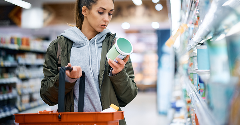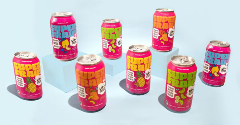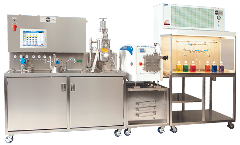Could nature-identical ingredients damage the natural sweeteners market?
4 Jul 2018Natural sweeteners are a major target for companies looking to make nature-identical food ingredients, but if they are produced in a lab rather than extracted from a plant, will consumers accept them as natural?

Companies looking to make nature-identical ingredients focus on growing sectors like natural sweeteners because they potentially hold the greatest reward. The processes used are not straightforward, but if they can succeed in scaling up production of rare molecules, they could bring the cost of natural sweeteners down by decoupling the most desirable compounds from their agricultural origins. However, if consumers can no longer tell whether an ingredient actually comes from nature or not, many commentators have suggested that the appeal of some natural ingredients could fade altogether.
Companies like Evolva in conjunction with Cargill, and DSM are exploring the production of nature-identical steviol glycosides – the sweet components in the stevia leaf. They both use fermentation of engineered yeast to produce some of the most sought after sweet compounds without the need for agriculture. These companies hail the process as better for the environment, because they produce ingredients with less energy and water, and allow precious agricultural land to be used for more essential foodstuffs. But it remains to be seen whether these environmental benefits chime with consumers’ expectations of natural ingredients – even if the sweeteners produced are chemically indistinguishable from plant extracts.
While steviol glycosides from fermentation are completely removed from the stevia plant, supplier PureCircle is working on a way to synthesise less common steviol glycosides like Reb D and Reb M, by starting with the more common Reb A compound derived from the plant. It says the resulting ingredients taste identical to Reb D and Reb M and have an advantage over fermentation-derived sweeteners because they retain their plant origins, thereby answering consumer demand for ingredients from nature.
Meanwhile, a German start-up called Savanna Ingredients claims to have found a way to scale up production of allulose, a low-calorie natural sugar that is found in very small quantities in nature, in foods such as figs, raisins, molasses and maple syrup. The company says its method uses enzymes to synthesise allulose from sugar beets. So far, the use of allulose in foods has been limited, but if Savanna Ingredients succeeds in scaling up the process, it could open the door to further products containing the sweetener, which has just 0.2 calories per gram, compared to 4 calories per gram in sugar.
Existing allulose suppliers include Tate & Lyle, Anderson Global Group, Astraea, and Matsutani Chemical Industry Co. Ltd.
Of course, what consumers say they want and what they actually buy often differ. Several studies have suggested that what matters most to shoppers is taste, price, convenience and nutrition. Only if expectations for these attributes are met do consumers start to consider other values, such as naturalness and ethical standards. But increasingly, consumers are rejecting artificial sweeteners, and manufacturers are responding with affordable, good-tasting natural alternatives.
When it comes to the burgeoning market for natural ingredients, suppliers face an enormously difficult task. Many have found sophisticated technologies that allow them to scale up the production of ingredients found in nature – but they must also convince consumers that these technologies are incidental.
Related news

Asian beverage brands deal with rising costs
4 Jan 2023
Decreasing bottle sizes or increasing prices? Asian beverage brands are finding “creative approaches” to manage rising costs, according to industry analysts.
Read more
Value-seeking US consumers cut back on food spending
2 Jan 2023
Cheaper items, smaller sizes, and shorter grocery lists: inflationary effects coupled with a global long-term recession are set to continue shaping food spending habits, according to a recent Rabobank report.
Read more
Opportunities grow for lower-caffeine coffee
23 Dec 2022
Many consumers want the mental focus of caffeine without the jitters, prompting a wave of product development such as “half caffeine” ground coffee or ready-to-drink (RTD) cold brew blended with relaxing botanicals.
Read more
Superfrau upcycles liquid whey for energy drinks
22 Dec 2022
US company Superfrau turns surplus whey into sustainable, upcycled-certified dairy products for the recovery drinks market.
Read more
Swedish food agency: One in 10 coffee brands contain excess acrylamide
7 Dec 2022
New findings from the Swedish Food Agency have revealed three of 29 coffee products sampled contained acrylamide above limits, reinforcing the link between levels and degree of roasting.
Read more
Editor’s choice: Our roundup of the latest women’s health products around the world
2 Dec 2022
From botanicals to combat menopause symptoms to a hydration powder for mothers-to-be, here is our roundup of the most innovative new product launches within women’s health.
Read more
The prize no brand wants to win: 2022’s most misleading products
28 Nov 2022
Food industry watchdog Foodwatch is asking consumers to vote for 2022’s most misleading product. A high-sugar vitamin water and “artisan” salad made with artificial additives are among the nominees.
Read more
enduracarb®: A science-backed trehalose ingredient for athletic endurance
24 Nov 2022
enduracarb® is a science-backed, slow-acting carbohydrate that can power athletes’ performance. Produced using a high-purity production process, it is suitable for a wide variety of applications.
Read more
China bans celebrity endorsement of health and formula foods
22 Nov 2022
China is to ban celebrity endorsement or advertising of certain products, completely banning high profile figures with “lapsed morals” as the country attempts to drive society towards “core socialist values”.
Read more
MicroThermics’ Formulators Guide to Process Selection for Plant-Based Beverages
15 Nov 2022
Plant-based beverages & products are mainstream! Come to FIE booth 4D122 & read our whitepaper to see how processing in the lab at commercial HTST & UHT conditions gets you to market faster for less!
Read more